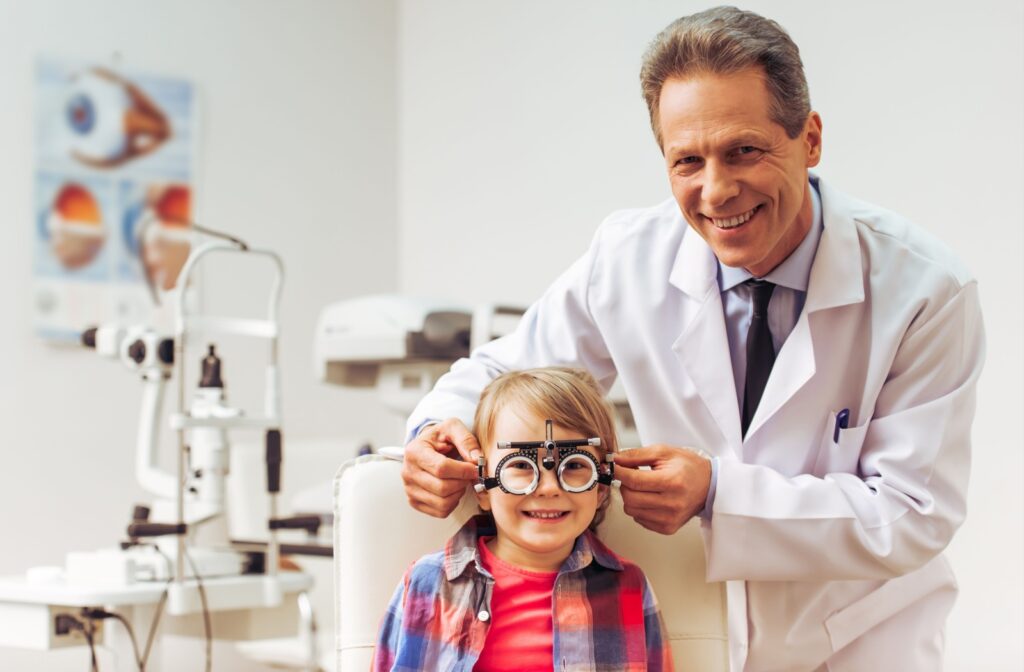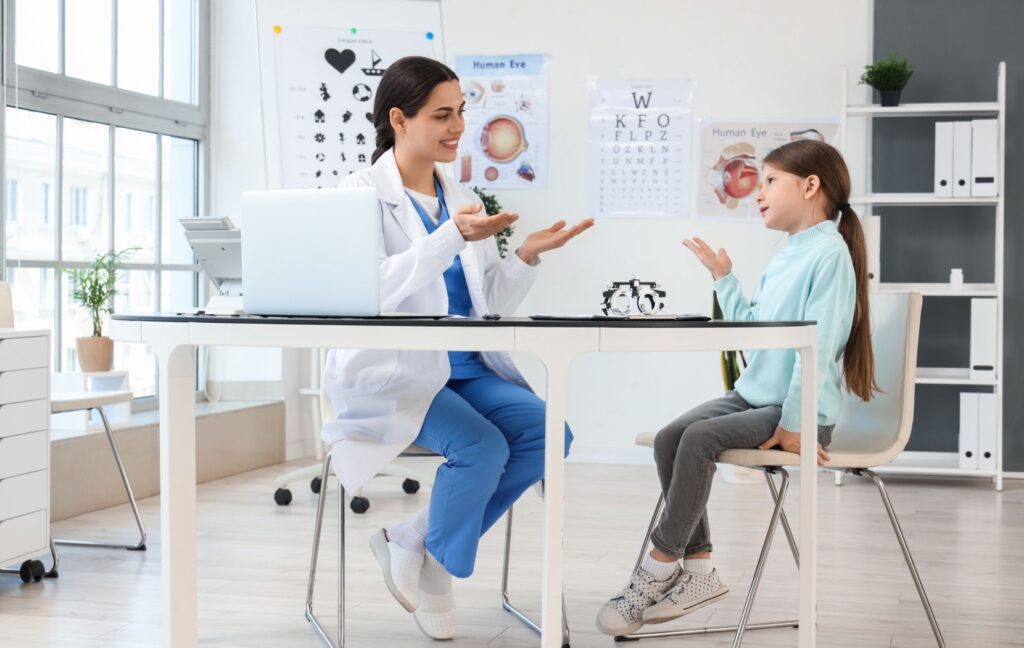Your child’s vision is essential to their learning, growth, and overall well-being. Regular eye exams not only protect children’s eye health but also set them up for long-term success.
At Eye Lab, we specialize in pediatric eye care for children ages 2 and up. Our doctors and staff are trained to work with young patients, ensuring a comfortable, engaging, and age-appropriate experience from start to finish.
During a typical kid’s eye exam, your optometrist will assess vision clarity, eye alignment, and overall health, using tools and tests tailored to your child’s age and needs. These exams are designed to be engaging and comfortable, creating a positive experience while identifying potential concerns early.
What Happens in a Kid’s Eye Exam?
A children’s eye exam is about more than just reading off an eye chart. At Eye Lab, we take a comprehensive approach to evaluating not only your child’s vision but also their overall eye health and development. Our team understands how to communicate effectively with young children and make the process fun and stress-free. Here’s a breakdown of the key components of our exams:
1. Visual Acuity Assessment
This is the familiar step where your child reads letters off an eye chart or identifies shapes and pictures if they’re younger. It determines how well they can see at different distances and identifies any challenges they might have.
2. Eye Alignment & Movement
We will check both eyes to ensure they’re aligned properly and moving together. Proper coordination is vital for clear and comfortable vision.
3. Refractive Error Evaluation
Refractive errors such as nearsightedness, farsightedness, or astigmatism can be detected during this part of the exam. We’ll assess whether your child may need glasses and determine the correct prescription if necessary.
4. Eye Health Assessment
Beyond vision, your child’s overall eye health is a major focus. By using special instruments, we can examine the internal structures, like the retina and optic nerve. This check helps identify any signs of abnormalities or early signs of conditions like lazy eye or crossed eyes.
5. Color Vision Test
To assess how your child perceives colors, we can perform a simple test to detect color blindness or color perception deficiencies.
6. Eye Coordination Test
Strong eye coordination is a major factor in reading and other everyday tasks. We may ask your child to track a moving object or perform exercises that evaluate the teamwork of their eyes.
7. Customized Additional Tests
Every child is unique, so if there are specific concerns (such as eye strain), we may include additional evaluations to tailor the assessment to your child’s needs.
Every step of the way, Eye Lab ensures the experience is friendly, age-appropriate, and engaging to help your child feel comfortable and cared for.

How to Prepare for Your Child’s Eye Exam
A little preparation can make a big difference in how smoothly the appointment goes. Here are some practical tips to help you and your child get ready:
1. Explain What to Expect
Kids feel more at ease when they know what’s coming. Use simple language to describe the process and reassure them that it’s non-invasive and not painful.
2. Discuss Concerns & Symptoms
If your child has mentioned symptoms like trouble reading the board at school, frequent headaches, or eye discomfort, jot them down. Share these with the optometrist during the exam.
3. Bring Relevant Information
If your child already has glasses or a prescription, bring those along. A family history of vision problems can also be helpful for the optometrist to know.
4. Ensure They’re Rested & Comfortable
Schedule the appointment when your child is well-rested and not hungry. Rested children are more cooperative and alert, making the exam more effective.
5. Include a Comfort Item
Sometimes a favorite toy or blanket can go a long way toward making a child feel calm and secure during the appointment.
Scheduling an Eye Exam During Back-to-School Season
Back-to-school season is an ideal time to focus on your child’s vision. Regular eye exams can address issues that may otherwise impact their academic performance and overall well-being. Here’s why an annual back-to-school eye exam is so important:
- Identify and Correct Vision Problems: If your child is struggling with nearsightedness, farsightedness, or astigmatism, a proper diagnosis and glasses can greatly enhance their learning experience.
- Prevent Developmental Delays: Undetected vision problems can slow down reading, writing, and other key learning milestones. Early detection ensures timely support for your child.
- Monitor Eye Health: Developing eyes need regular check-ups to ensure that potential issues—like lazy eye—are caught early and treated effectively.
- Screen-Time Readiness: With increased reliance on tablets and computers in schools, reducing eye strain and maintaining healthy vision is critical for a successful school year.
- Update Prescriptions: Children’s vision can change rapidly as they grow, so it’s important to ensure they have the correct prescription going into a new school year.
Helpful Tips for Booking Your Appointment
Here’s how to make scheduling as easy as possible:
- Plan Ahead: Popular periods, like late August, fill up quickly. Book your appointment 2-3 weeks in advance to secure your preferred time slot.
- Check Insurance: Review your vision insurance to see if children’s annual eye exams are covered and what costs to expect.
- Choose the Right Timing: Morning appointments are often best for younger children, as they’re more energetic and cooperative earlier in the day.
- Communicate Concerns: Sharing any observations or concerns before the appointment ensures the optometrist can provide targeted care.
Prioritize Your Child’s Eye Health
Prioritizing your child’s vision health doesn’t just mean clearer sight; it means supporting their overall academic success, happiness, and development. At Eye Lab in North Scottsdale, we proudly specialize in pediatric care for children ages 2 and up. Our team is trained to deliver expert care in a nurturing, kid-friendly environment. We’re here to help you every step of the way—with comprehensive exams tailored for kids of all ages, a friendly atmosphere, and the expertise parents trust. Booking an eye exam with us is easy, and it could make all the difference for your child’s bright future. Start the school year off right by scheduling their next eye exam today.





